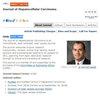Prolonged Complete Remission Using Tislelizumab for Hepatocellular Carcinoma After Adjuvant Chemotherapy Failure: A Case Report
IF 4.2
3区 医学
Q2 ONCOLOGY
引用次数: 0
Abstract
Abstract: In recent years, there have been limited reports on the efficacy of later-line anti-programmed cell death − 1 (PD-1) therapy in achieving prolonged and complete remission in patients with hepatocellular carcinoma (HCC). Tislelizumab, a humanized anti-PD-1 monoclonal IgG4 antibody, has shown promising results in the treatment of HCC. This report highlights the case of a patient with HCC who experienced the development of lung metastatic lesions following HCC resection and chemotherapy, but achieved a prolonged complete response (CR) after receiving tislelizumab treatment. In April 2017, a 56-year-old male diagnosed with primary HCC underwent hepatectomy and hepatic arterial infusion pump placement. Following the surgery, the patient received adjuvant hepatic arterial infusion chemotherapy (HAIC) with 4 cycles of cisplatin+5-fluorouracil (PF) regimen starting in June 2017. In May 2018, lung metastatic lesions were detected, and the patient underwent 4 cycles of oxaliplatin+leucovorin+5-fluorouracil (FOLFOX) chemotherapy. However, the disease progressed in August 2018, leading to the administration of arsenic trioxide treatment. Despite this, further progression was observed in October 2018, prompting the patient’s enrollment in a clinical trial for tislelizumab therapy. Initially, the patient achieved a partial response (PR) to tislelizumab, which was followed by a CR that lasted for almost 4 years. Unfortunately, tislelizumab treatment had to be discontinued due to immune-related adverse events (AE). Subsequently, the patient received lenvatinib and maintained a CR until July 2023. Tislelizumab monotherapy, when used as a third-line treatment, has demonstrated remarkable efficacy in facilitating patients with advanced HCC to attain a durable CR.Keywords: hepatocellular carcinoma, complete response, immune checkpoint inhibitor, tislelizumab, chemotherapy failure, metastasis
辅助化疗失败后,使用替斯利珠单抗治疗肝细胞癌获得长期完全缓解:病例报告
摘要:近年来,关于后期抗程序性细胞死亡-1(PD-1)疗法在肝细胞癌(HCC)患者中实现长期和完全缓解的疗效的报道有限。Tislelizumab是一种人源化的抗PD-1单克隆IgG4抗体,在治疗HCC方面显示出良好的效果。本报告重点介绍了一例在HCC切除和化疗后出现肺转移病灶,但在接受替斯利珠单抗治疗后获得长期完全应答(CR)的HCC患者。2017 年 4 月,一名 56 岁的男性患者被诊断为原发性 HCC,接受了肝切除术和肝动脉输注泵置入术。术后,患者于2017年6月开始接受顺铂+5-氟尿嘧啶(PF)方案4个周期的辅助肝动脉输注化疗(HAIC)。2018年5月,发现肺部转移病灶,患者接受了4个周期的奥沙利铂+亮菌甲素+5-氟尿嘧啶(FOLFOX)化疗。然而,2018 年 8 月病情出现进展,导致患者接受了三氧化二砷治疗。尽管如此,2018 年 10 月观察到病情进一步进展,促使患者加入替赛珠单抗治疗的临床试验。最初,患者对替斯利珠单抗取得了部分应答(PR),随后又取得了持续近 4 年的 CR。不幸的是,由于免疫相关不良反应(AE),患者不得不停止了替斯利珠单抗的治疗。随后,该患者接受了来伐替尼治疗,并在2023年7月之前一直保持着CR状态。关键词:肝细胞癌;完全应答;免疫检查点抑制剂;替莱珠单抗;化疗失败;转移灶
本文章由计算机程序翻译,如有差异,请以英文原文为准。
求助全文
约1分钟内获得全文
求助全文

 求助内容:
求助内容: 应助结果提醒方式:
应助结果提醒方式:


